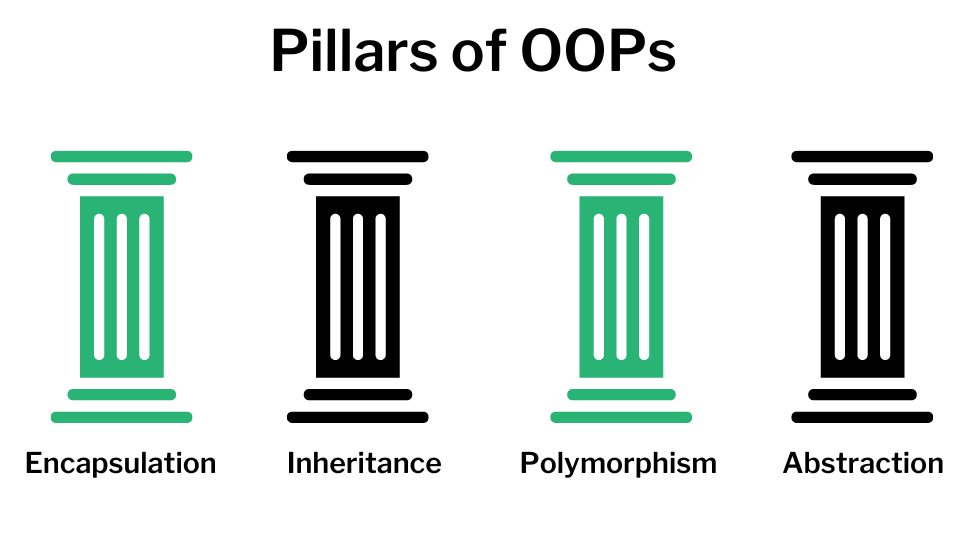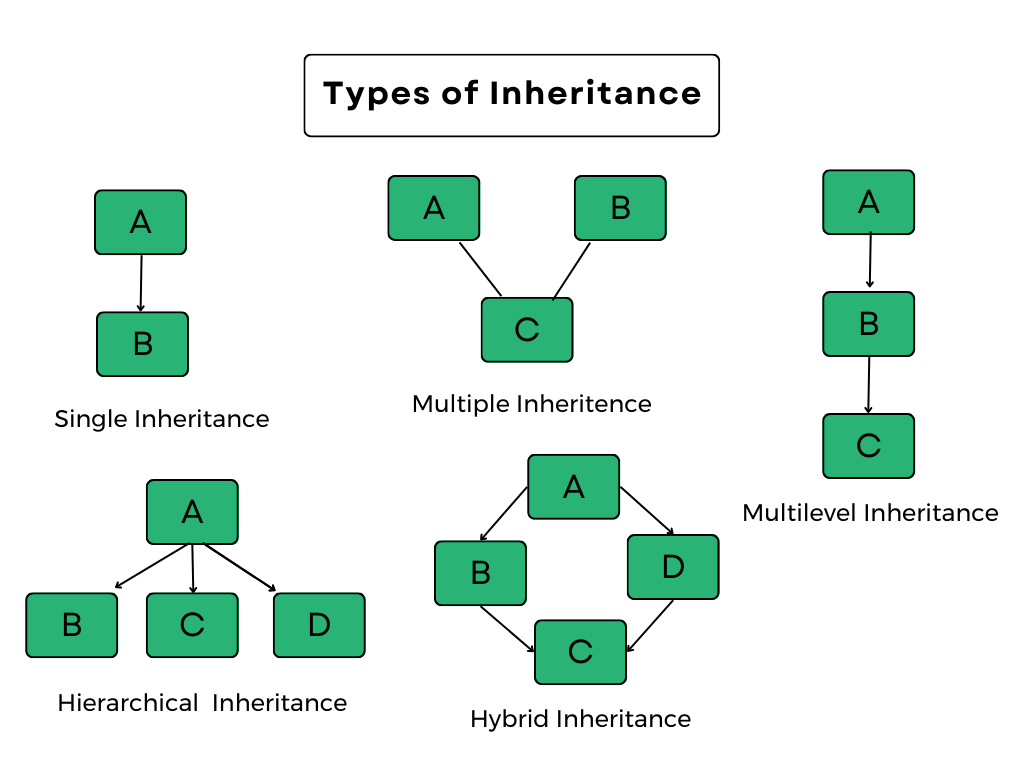Object Oriented Programming (OOPs) is a programming paradigm that makes use of creating objects and their interactions to solve complex problems. OOPs is one of the most popular programming paradigms used in the software development field. It provides a clear and modular structure for writing programs while following coding principles like SOLID.
In this blog, we will discuss the TOP 25 OOPs interview questions from beginner, fresher to experienced candidates that can be asked during an interview.
Basic OOPs Interview Questions:
Question 1. What is Object Oriented Programming (OOPs)?
Answer- Object-oriented programming (OOPs) is a programming technique that is based on the concept of objects, which can contain data and methods. It allows developers to create modular, reusable code and provides a clear and structured way of solving complex problems.
Objects are based on classes that act as a blueprint having some properties as data members and methods.
Question 2. What are the four pillars of OOPs?
Answer- The four pillars of OOPs are:
- Encapsulation
- Inheritance
- Polymorphism
- Abstraction

Question 3. What is inheritance?
Answer- Inheritance allows a class to be based on an existing class. The new class inherits properties and methods from the existing class along with its own properties and methods. This allows developers to reuse code and create more efficient and structured programs while following the do not repeat coding principle.
Different types of inheritance
- Single Inheritance: A child class that is directly derived from the base class.
- Multiple Inheritance: A child class that is descended from several base classes.
- Multilevel Inheritance: A child class is derived from a class that is derived from another base class.
- Hierarchical Inheritance: The inheritance of several child classes from a single base class.
- Hybrid Inheritance: Inheritance consisting of numerous inheritance types from the list above is referred to as hybrid inheritance.

Question 4. What is polymorphism?
Answer- Polymorphism is a concept that allows objects to take on different forms and behave in different ways depending on the context. There are two types of polymorphism i.e. compile-time and runtime polymorphism and this can be achieved through method overloading or method overriding respectively.
Question 5. What is encapsulation?
Answer- Encapsulation is the process of data and methods hiding within a class so they are not accessible outside the class. It is done with the help of access modifiers. Encapsulation ensures more secure and reliable code.

Question 6. What is abstraction?
Answer- Abstraction is one of the most important concepts of OOP. It allows showing only required data and methods while hiding the complexity of their implementation and details from the user. Abstraction can be achieved through abstract classes and interfaces, to show a high-level view of the functionality without exposing the implementation details. Abstraction allows for more modular and scalable code.
Question 7. What is a class?
Answer- A class is a blueprint or template for creating objects. It contains the properties and methods. The class consists of user-defined variables, member functions, and a constructor. A class can also have static members which belong to the class itself and do not require the objects.
Question 8. What is an object?
Answer- An instance of a class is known as an object. It contains the data and methods defined by the class and can interact with other objects in the program. Objects are the building blocks of OOPs and allow for more modular and reusable code. Objects occupy space in the memory.
OOPs Interview Questions for Freshers
Question 9. What is the difference between object-oriented programming and procedural programming?
Answer- Object-oriented programming (OOPs) is a programming paradigm that is based on the concept of classes and objects, while procedural programming is based on procedures or functions. OOPs allows for more modular and reusable code, while procedural programming is suitable for linear fashion programs.
Question 10. What is a constructor?
Answer- A constructor is a block of code in Java that initializes an object and sets initial values for attributes. Requiring the same name as that of a class, a constructor is called by default when an object is created and has no return type.
- Default Constructors: Default constructors, in Java, are the no-argument constructors to initialize instance variables, which will be created by default if any other constructor isn’t already defined by the programmer.
- Parameterized Constructors: Parameterized constructors, in Java, have a specific number of arguments to be passed and initialize instance variables with provided values. These are written explicitly by the coder.

Question 11. What is method overloading?
Answer- Method overloading is the process in which multiple methods have the same name but different parameters. The method that is called depends on the number and type of parameters that are passed. Method overloading allows for more flexible and modular code. Method overloading is done to achieve compile-time polymorphism.
Question 12. What is method overriding?
Answer- Method overriding is the process of defining a method in a child class with the same signature as a method in the parent class. The overridden method must have the same number of parameters and the same parameter types as the parent class method. When a method is called on an object of the child class, the child class method overrides the parent class method.
Method overriding is also known as runtime polymorphism because the method that is called depends on the actual type of the object at runtime, rather than the declared type of the reference variable.
Question 13. What is a static method?
Answer- A static method belongs to a class, not an instance. It’s called using the class name, not the object name. Static methods perform tasks that don’t require an object to be created, making them useful for utility methods or operations on multiple objects.
Question 14. What is the difference between an abstract class and an interface?
Answer- An abstract class can contain both abstract and concrete methods, while an interface can only contain abstract methods. An abstract class can also contain instance variables, while an interface cannot.
Question 15. What is the difference between a constructor and a method?
Answer- Objects are initialization is a task that can be performed by constructors, which are specific methods that have no return type and share the same name as their corresponding class. In contrast, methods serve the purpose of executing operations and returning values and can be named differently and have a return type
Question 16. What is the difference between static and non-static methods?
Answer- Static methods are associated with the class and can be invoked using the class name. While non-static methods are associated with the instances of a class and can only be invoked on an object of that class.

Question 17. What is the difference between an instance variable and a static variable?
Answer- Variables that are associated with instances of a class and possess a unique value for each instance are known as instance variables. While the static variables are related to the class itself and possess the same value for all instances of the class.
Question 18. What is the access modifier in Java?
Answer- The access modifiers are keywords that determine the accessibility of a class, method, or variable. There are four access modifiers in Java: public, private, protected, and default.
Prepare more Java Interview Questions.
Question 19. What is the difference between an abstract class and a concrete class?
Answer- An abstract class must be inherited in a subclass in order to be used, while a concrete class can be instantiated and used directly.
Question 20. What is a virtual function?
Answer- A virtual function can be declared in the base class, which can then be redefined in a derived class. Virtual functions enable the polymorphism i.e. allowing objects of different types to exhibit different behavior.
OOPs Interview Questions for Experienced:
Question 21. What is the SOLID principle in OOPs?
Answer- SOLID stands for Single Responsibility, Open/Closed, Liskov Substitution, Interface Segregation, and Dependency Inversion. These principles are used to create more maintainable and scalable code by promoting modularity, flexibility, and extensibility.
Question 22. What is a design pattern?
Answer- A design pattern solves the irregularity problem in software design and provides various solutions and structures using concepts like OOPs which is a reusable solution. The use of design patterns provides a standardized approach and terminology for tackling problems, which enhances code modularity, maintainability, and scalability
Question 23. What is the difference between composition and inheritance?
Answer- The process of combining basic objects or data types to produce more complex objects is referred to as composition.
Inheritance involves creating a new class (child class) that inherits the attributes and methods of an existing class (parent class).
Composition is generally more flexible than inheritance and leads to more modular and maintainable code.
Question 24. What is a singleton class?
Answer- A singleton class is a class that can only have one instance. It is frequently employed to manage access to shared resources, such as files or databases. Singleton classes help in the preservation of data consistency and concurrency issues.
Question 25. What is the difference between shallow copy and deep copy?
Answer- A shallow copy is a copy of an object that only copies its top-level properties and references to other objects. A deep copy is a copy of an object that creates a new instance of the object and recursively copies all of its properties and references. Shallow copies are faster and less memory-intensive than deep copies but can lead to unexpected behavior if the original object is modified.
Let’s go! In this blog, we have discussed some common OOPs interview questions that can help you prepare for your upcoming interview. We encourage you to explore more blogs and resources to enhance your skills further.
- Data Science vs Data Analytics: Top Key Differences for Success

- How To Become A Data Scientist In India?: Achieve Your Data Scientist Dreams

- What are Callback Function in JavaScript?: A Guide to Effective Implementation

- Top 9 Interview Questions and Answers for Freshers Success

- What Is Python and Its Dynamic Uses?


